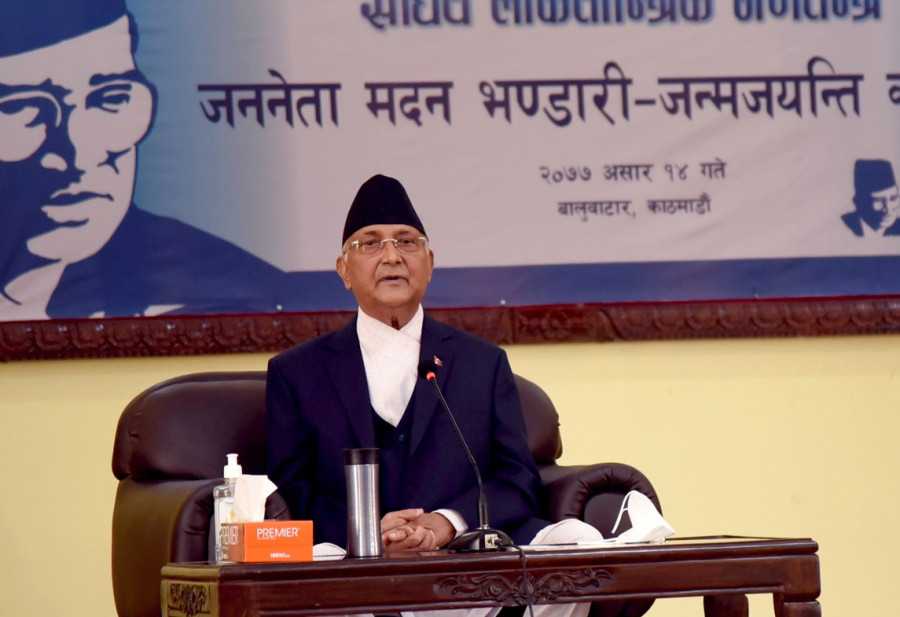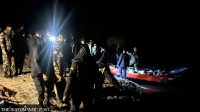National
Faced with criticism, Oli sees plots being hatched to unseat him in Delhi and Kathmandu
The prime minister has once again fallen back on his nationalistic rhetoric, saying certain actors are trying to remove him for adopting a new political map.
Tika R Pradhan
Faced with mounting criticism from both within the ruling Nepal Communist Party and outside, Prime Minister KP Sharma Oli has turned to a tried-and-tested formula of his, pointing to nebulous plots being hatched in New Delhi and Kathmandu to unseat him.
“Plots are being hatched to topple me for releasing the country’s new map and getting it adopted through Parliament,” Oli said on Sunday while addressing an event organised by the Madan Bhandari Foundation at Baluwatar to commemorate the leader’s 69th birth anniversary.
“Given the ongoing intellectual discussions, media reports from New Delhi, [Indian] embassy’s activities, and meetings at different hotels in Kathmandu, it is not very difficult to understand how people are actively trying to unseat me. But they won’t succeed.”
The Oli government has been roundly criticised from across the political spectrum and by the public for its failures on multiple fronts, but particularly the Covid-19 pandemic. But just as the criticism was reaching fever pitch, Oli pushed hard to release the new political map and incorporate it into the constitution, briefly winning over the parties and the public. The new map, which depicts Kalapani, Lipulekh and Limpiyadhura as parts of the Nepali territory, was welcomed by most Nepalis as critical to the national interest and the country’s territorial integrity, deflecting criticism away from the government.
But with the map passed, Oli’s critics have taken aim once again, with party members readying to rake the prime minister, who is also a party chair, over the coals at the ongoing Standing Committee meeting. Oli is aware that his own party leaders have massed against him and has thus been attempting to avoid attending the Standing Committee meeting.
Sunday’s address, say party insiders, shows that Oli is preparing for confrontation.
“Instead of presenting his issues at the ongoing party meeting, Oli presented his views outside, which will do more harm than good,” said Maheswor Dahal, a Central Committee member. “It’s surprising that the prime minister skipped the party’s meeting but talked against party leaders at a different forum. It will certainly further escalate the intra-party conflict.”
Aligned against Oli in the party is Pushpa Kamal Dahal, the other party chair and Oli’s chief rival, who has also been making veiled comments aimed at Oli.
On Wednesday, the first day of the Standing Committee meeting, Dahal said that “sacrifices” would have to be made.
Party insiders and analysts believe that Dahal and his allies, which include senior leaders Madhav Kumar Nepal, Jhala Nath Khanal, Bamdev Gautam and Narayan Kaji Shrestha, are preparing to demand that Oli choose between the party chair or the prime ministership.
The Dahal faction, which has come to be known as the Bhaisepati alliance, has long protested Oli’s unilateral manner of decision-making.
The ‘Bhaisepati alliance’ is named after Gautam’s place of residence where a faction under Dahal came together with the backing of Oli’s old comrades Nepal, Gautam and Khanal.
When Oli spoke about plots being hatched in both Delhi and Kathmandu, many believe that he was alluding to Dahal, who along with Nepal, has upped the ante against Oli lately.
“No one has talked about unseating him, but Oli seems to be worried, especially after Dahal talked about sacrifice,” said Matrika Yadav, a Standing Committee member who is close to Dahal. “If he fails to change his working style, the party could take a decision against him.”
Oli’s supporters, however, believe that the prime minister is rightly calling out the actions of some leaders who are capitalising on New Delhi’s displeasure at the new map.
“Everyone knows that India wants to oust Oli, not within a minute but in seconds,” said Satya Narayan Mandal, a Standing Committee member who is close to Oli. “And some of our greedy leaders are trying to cash in on this and are opposing the government’s activities.”
But Oli’s penchant for nationalist rhetoric is well-known, especially at times of crisis. He was elected on a nationalist plank after widely opposing India’s 2015 blockade and signing a trade and transit treaty with China. Oli brought up the agreement with China in Sunday’s speech, pointing to how his then government had been toppled because he did not have a majority. In August 2016, Dahal, then leading the Maoist party, had allied with the Nepali Congress to topple Oli’s government.
But in late 2017, in the lead up to the elections, Oli and Dahal forged an electoral alliance, ultimately winning majority seats to form the government in February 2018 under Oli. In May 2018, Oli’s CPN-UML and Dahal’s CPN (Maoist Centre) announced a merger to form the Nepal Communist Party (NCP). However, the unification process has yet to be completed and the rivalry between Oli and Dahal continues.
The Oli and Dahal factions are at odds once again, with the latter accusing Oli of trying to run the party and the government unilaterally.
The ongoing Standing Committee meeting was also forcefully called by Oli’s opponents, leading Oli to skip the meeting.
According to party insiders, if the Dahal faction fails to force Oli to capitulate at the party committee, it will try to employ the Parliamentary Party to make him step down, as Oli falls short of around eight seats if a vote of no confidence is brought against him.
Sensing that the opposing faction is trying to build pressure on him, Oli took a jibe at Dahal as well on Sunday.
“If anyone thinks they can topple me, I would like to remind them that our national unity is not that weak,” said Oli. “The Nepal Communist Party and its Parliamentary Party do not get swayed by anyone. It would be better if every one understands this fact that the map was not published just like that.”
But according to political analysts, Oli is once again playing the nationalist card to divert attention.
“Stung by his own party’s opponents, PM Oli has started pointing fingers at foreign elements for making a bid to topple his government. It is the strategy of a bewildered ruler,” Lok Raj Baral, a professor of political science, wrote on social media.




 22.25°C Kathmandu
22.25°C Kathmandu














